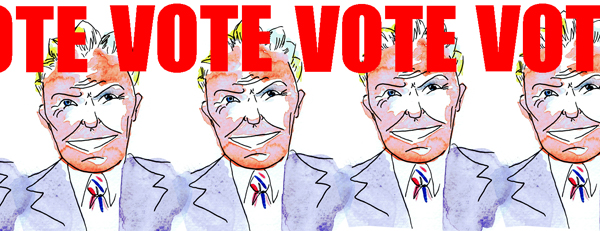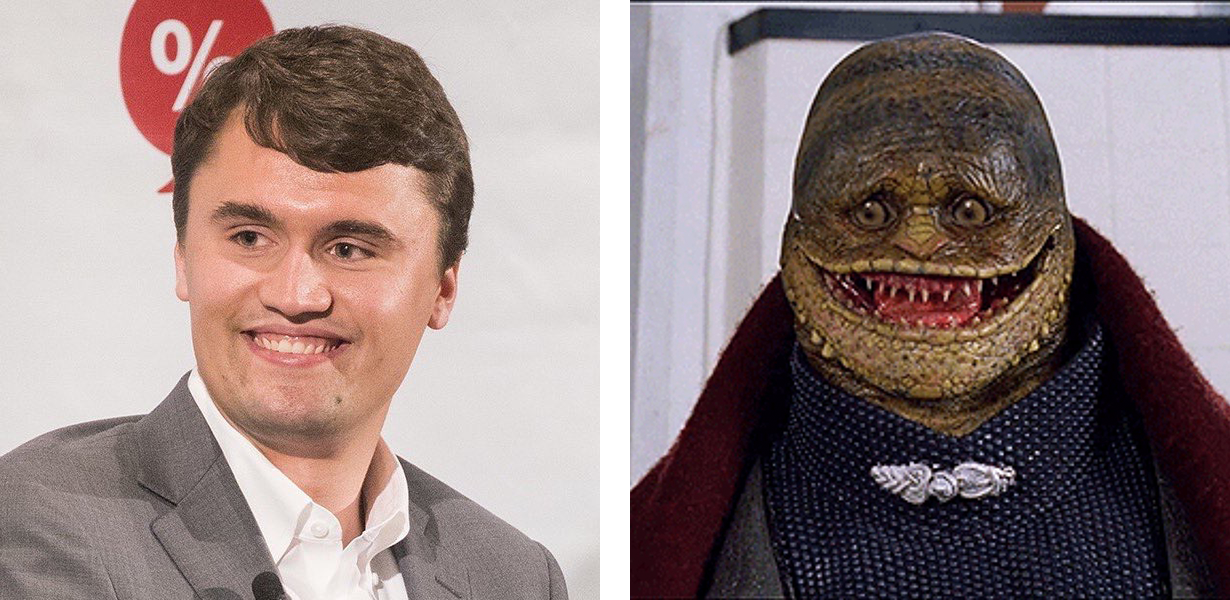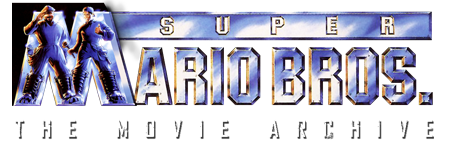Guest Editorial: "Koopaism is Capitalism"
Written by: John Leavitt
Posted: June 22, 2018

Writer and cartoonist John Leavitt discusses the political themes and subtext of the film and how they relate both to American history and the contemporary American political climate.
EDITOR’S NOTE: The opinions expressed by Super Mario Bros.: The Movie Archive guest contributors are their own and do not necessarily represent those of the SMB Archive, its editor-in-chief, or Nintendo.
Super Mario Bros. is a ridiculous movie, but as we find ourselves in ridiculous times, the 25th anniversary gives us opportunity to reflect on the themes and messages of the movie and how much more relevant they are to our current situation then in 1993.
Let me say it now: Super Mario Bros. anticipated 2018.
It’s not just that we live in a cyberpunk dystopia, that was always a given. It's that we live in a cyberpunk dystopia with an ongoing ecological crisis based on constant exploitation of the poor and working class ruled by a deranged, narcissistic despot with weird hair.
The Dinohattan of Super Mario Bros. is a bizarre shadow version of the worst fears about New York CIty. Its government, a tinpot rule by cronies and relatives of the guy in charge, is a fear of machine and mob rule politics. Its environment, collapsing and degraded, is a 1990s concern about pollution and the effect global capitalism. All fears now everyday reality except we don’t have any cool punky fashion or pneumatic jump shoes.
Seriously, what is the point of living in a cyberpunk dystopia without the outfits?
The central antagonist and prime mover of the movie is Dennis Hopper’s King Koopa, called King despite the fact that he’s clearly running a Presidential/mayoral style campaign. Maybe it’s a ceremonial title, like “boss” Tweed. It’s his desires and actions that push the plot forward.
So what does King/President Koopa do? He consumes. He steals girls. He exploits. He threatens, menaces, mocks and degrades. His revolting personality reflected in physical and interpersonal grosterique. He claims royal and distinguished lineage to the Tyrannosaurus Rex, Tyrant King of the dinosaurs. He’s a germaphobe who sends his idiot relatives on jobs they quickly and readily screw up. But Koopa is, above all else, a businessman, a capitalist, a media figure, and “deal maker” who’s eliminated all other opponents except the physical laws of reality itself. The kind of mind that imagines Koopa Tower cannot imagine scarcity, or limits, or conservation, and it gets annoyed when it can't get what it wants when it wants it. Why else would you keep funding a clearly ineffective outer-boro kidnapping project? He sounds like he’s on an infomercial even when he’s talking to himself. He’s never not selling. And he sees the biggest hostile takeover of all time with the merger and acquisition of planet Earth.
What prompts King Koopa to merge the dimensions? Resource scarcity. There’s no more clean water or air thanks to Koopa’s relentless strip-mining of the natural world. The looming collapse prefigures our current fears and reality around climate change, that the planet is more hostile to human life because we made it so.
Koopa wants what Elon Musk and Jeff Bezos want: a way out of the world he’s corrupted and used up. Capitalism requires non-stop growth in order to succeed. Late-stage capitalism is when they run out of frontiers and turn on each other. The cannibalistic all-against-all world of Koopa can only continue itself via expansion and exploitation of new worlds and dimensions. The fact that there’s no competing ideology within his world is the point, as Mark Fisher said about disaster stories, “It’s easier to imagine the end of the world than the end of capitalism.”
Just in case there was ambiguity, when Spike and Iggy get Evolved they immediately identify Koopa as the problem.
“Spike: Fascist!
Iggy: Oppressor of the proletariat!
King Koopa: Guy in charge!”
Oh! But you might say! There is a competing ideology! There’s Toad! Yes, Toad the street musician exists. And he does sing songs against King Koopa and his destruction of the water and and the air - but like so many late night talk show hosts the effort is in vain. Satire is for in-group morale, not a weapon against oppression. Rebellion doesn’t mean much if the police (who seem owned by Koopa directly cause the corporation is the state, the very definition of fascism) can round you up for singing a song and make you go away forever.
Toad undergoes Devolution, transformation into an obedient lizard-like hulking figure called a Goomba. The Goombas are even further back in political ideology, “loyal to the royal family” and without thoughts of their own. They are the simple machines of feudalism, the natural end goal of workers in Capitalist ideology. Consider this exchange from R.U.R., a 1920 science fiction play by the Czech writer Karel Čapek.
“What sort of worker do you think is best from a practical point of view?”
“Perhaps the one who is the most honest and hardworking.”
“No, the one who is the cheapest. Who's requirements are the smallest. Young Rossum invented a worker with the minimum of requirements. He had to simplify him.”

Taking something as complicated as a person and reducing them to something as simple as a machine is the operating principle of economic systems in our own world. It further alienates and separates their actions from anything meaningful and in doing, separates workers from from organizing against it, at least according to Marx. R.U.R. is credited with inventing the word robot, from the czech robota, meaning forced labor.
If you can’t make people into basically mindless automaton via work, then lobotomize them into unthinking widgets for your regime, endlessly playing the harmonica for the Koopa Corp. Sheesh, Brave New World was less bleak. Our plucky working class plumbers really have their work cut out for them.
So how does one even start to attack something as monstrous, as ugly, as cruel and dumb as the reign of Koopa?
You know what the largest organism in the world is? It’s a fungus. Located in the Pacific Northwest, just under the ground is a 2,384 acre-wide Armillaria ostoyae believed to be at least 2,400 years old. The fungus in Super Mario Bros. is supposed to be the devolved monarch: headless but spreading everywhere, a constant reminder of something Koopa couldn’t destroy.
There’s a saying in activist circles, “They tried to bury us but we were seeds.” I like to think of it like fungal spores. Movements can be dried out and gone for years until just the right amount of moisture hits it. Then it's impossible to get rid of. The organizing power of people is a bit like black mold, if it takes hold you’ll have to knock the building down and start over. Or put another way, a tyrant has to be lucky everyday, his opponents only have to be lucky once.
What is Luigi is always saying in this movie? Anything is possible if you believe.
Trust the fungus.
-JohnLeavitt
